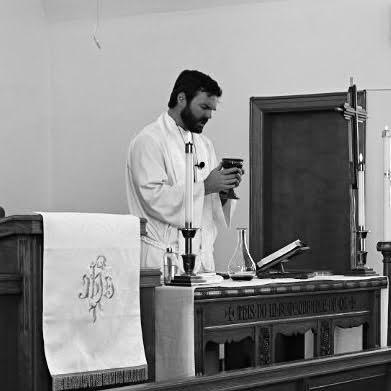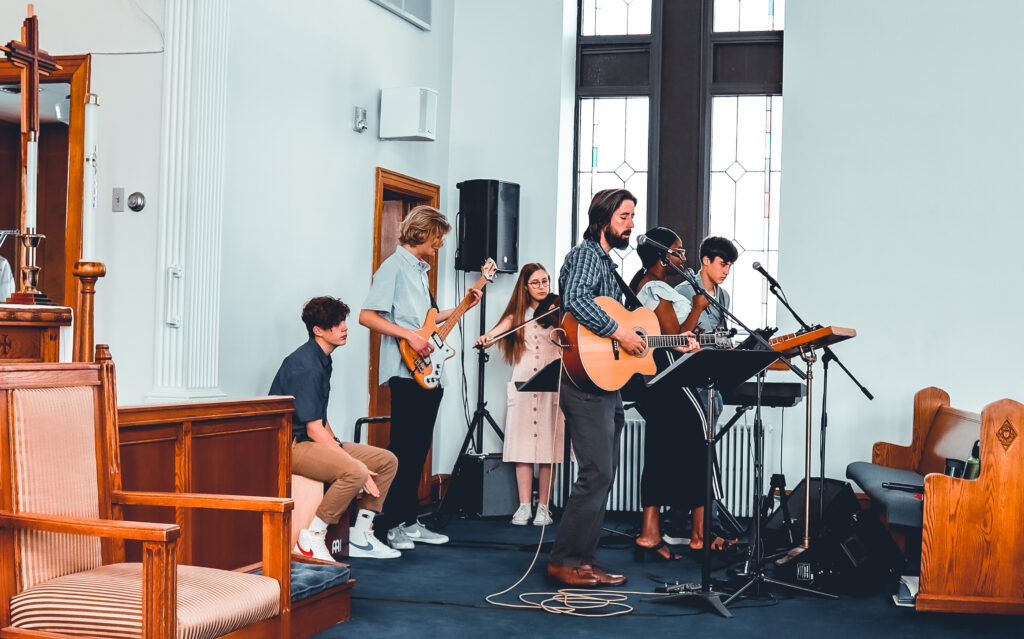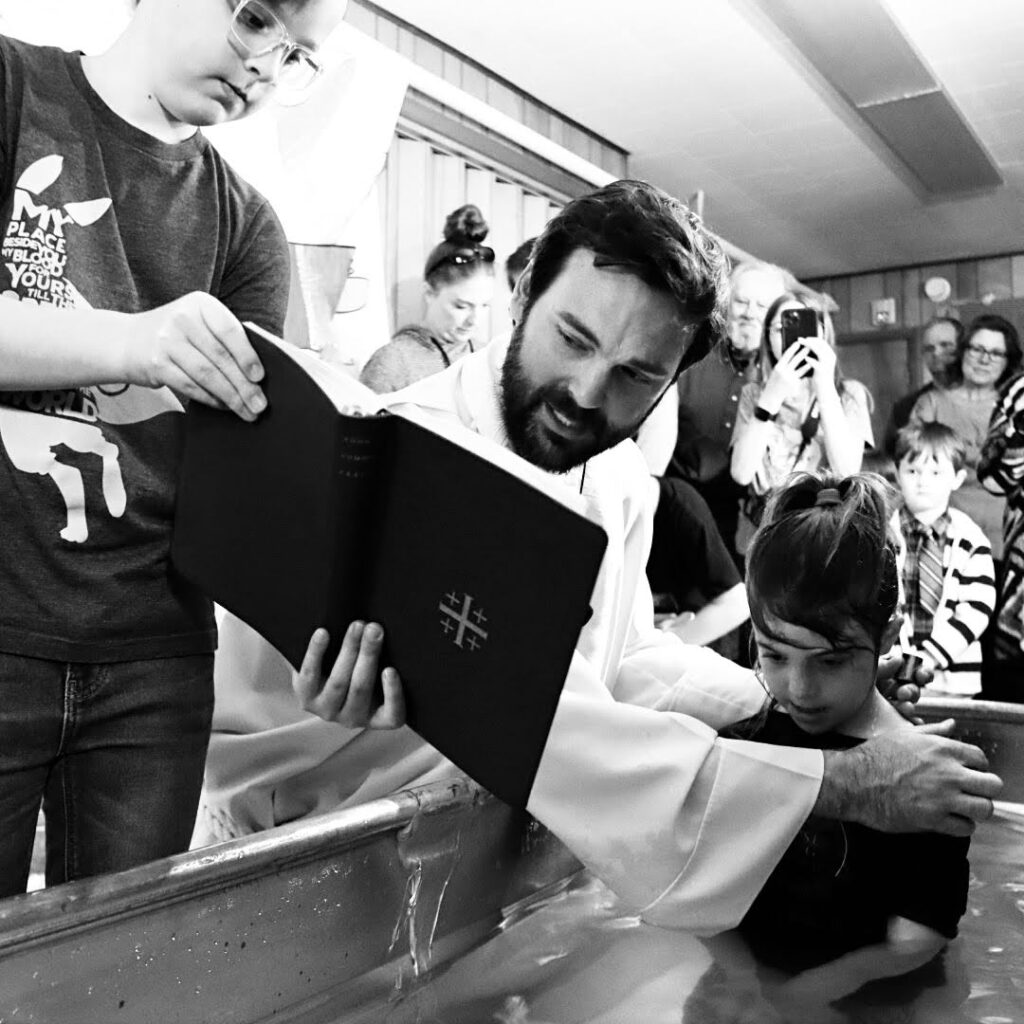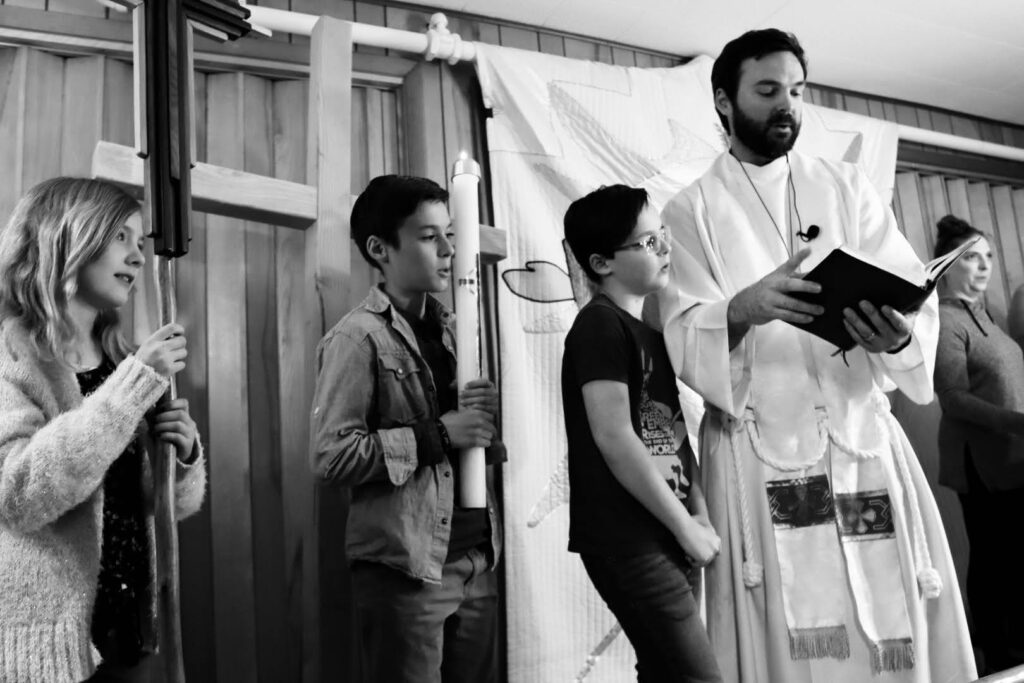“Worship the King, around the table, for the life of the world.”
Jesus of Nazareth is the Savior of the world, the Lord of all creation, and King of heaven and earth. We exist as a church to worship and exalt King Jesus and to make him known in Beckley, West Virginia, and all the earth. By His grace and mercy alone we are redeemed, restored, and lifted up together in Christ.

To that end, our three-part mission statement at Christ the King is simple. We exist to…
What exactly does that mean? Does our mission statement come from the Bible or did we just make it up? Read below for further reflection on each part of our mission. You can click the links above to scroll down the page.
“Worship the King”
Pilate also wrote an inscription and put it on the cross. It read, “Jesus of Nazareth, the King of the Jews.” Many of the Jews read this inscription, for the place where Jesus was crucified was near the city, and it was written in Aramaic, in Latin, and in Greek. So the chief priests of the Jews said to Pilate, “Do not write, ‘The King of the Jews,’ but rather, ‘This man said, I am King of the Jews.’” Pilate answered, “What I have written I have written.”
John 19:19–22 (ESV)
Throughout the Gospel of John, Jesus says that the Son of Man must be “lifted up” (John 3:14, 8:28, 12:34), just as a king is lifted up on his throne. But Jesus the true King confounds the wisdom of this world (Mark 10:42-45).

The Incarnate, Humble King Jesus
Jesus, the all powerful Creator of everything (John 1:3) was made for a little while lower than the angels (Heb 2:9), born of woman, and lifted up on a cross, crowned as King with a crown of thorns. He died, was buried, and on the third day he rose again from the grave, and he ascended to the Father in heaven, “crowned with glory and honor because of the suffering of death, so that by the grace of God he might taste death for everyone” (Heb 2:9). We share in his rule on earth wearing a crown of thorns (Eph 5:23), by giving up ourselves to his service (Mark 10:44), and by walking before him in holiness and righteousness all our days (John 14:21).
And [James and John] said to [Jesus], “Grant us to sit, one at your right hand and one at your left, in your glory.” Jesus said to them, “You do not know what you are asking. Are you able to drink the cup that I drink, or to be baptized with the baptism with which I am baptized?” And they said to him, “We are able.” And Jesus said to them, “The cup that I drink you will drink, and with the baptism with which I am baptized, you will be baptized, but to sit at my right hand or at my left is not mine to grant, but it is for those for whom it has been prepared.”
Mark 10:37–40 (ESV)
“around the table”
Then Ziba said to the king, “According to all that my lord the king commands his servant, so will your servant do.” So Mephibosheth ate at David’s table, like one of the king’s sons. And Mephibosheth had a young son, whose name was Mica. And all who lived in Ziba’s house became Mephibosheth’s servants. So Mephibosheth lived in Jerusalem, for he ate always at the king’s table. Now he was lame in both his feet.
2 Samuel 9:11–13 (ESV)

Table Fellowship is a Blessing
The story of lame Mephibosheth, son of Saul, eating at King David’s table is a powerful picture of God’s grace. Eating, in Holy Scripture, is often a sign of God’s abundant blessing: from the first page (“You shall have them for food.” Gen 1:29) to the last (“Blessed are those who are invited to the marriage supper of the Lamb.” Rev 19:9).
Broken Table Fellowship
But eating together, table fellowship was broken with a bite of food in the Garden (Gen 3:6). Israel cried out for water (Ex 15:24), they cried out for food (Num 11:4) and their eating was the sign of their downfall (Num 11:33). Food can be a sign of restoration, but it also shows us our idolatry (Phil 3:19; 1 Cor 11:34).
Jesus Restores Table Fellowship
Restored table fellowship around King Jesus’ table is central to the gospel, that’s why Jesus gave us a meal to eat (Luke 22:14-23) as often as we gather (1 Cor 11:25). Anglican worship is all about Jesus, the Word made flesh. We read the Word, preach the Word, and receive the Word in the Sacrament of the Lord’s Supper. Restored table fellowship is central to the gospel story.
Jesus entered into the homes of Pharisees (Luke 7:36), tax collectors (Luke 5:30, 7:34), centurions (Luke 7:6), prostitutes, Jews, Gentiles, rich, poor, small town Nazareth, big city Jerusalem, sinners all (Luke 15:2), Jesus ate with them. He touched the unclean, the withered. He fed the hungry (Luke 9:13). Jesus ate with the despised, with slaves, with slave-masters, with women, with men. At every meal, with every encounter, Jesus brought the “good news” of Isaiah (Luke 4:19), the year of the Lord’s “welcome,” with no partiality. “Blessed is everyone who will eat bread in the kingdom of God” (Luke 14:15). After his resurrection, Jesus walked with his disciples and they didn’t recognize him until he broke bread with them (Luke 24:30-31), and they reclined at table with him and ate (Luke 24:41-42).
We Follow Jesus, We Go, & Eat
Jesus sent out his disciples to do the same: go, sit, and eat with all people, and proclaim the year of the Lord’s welcome (Luke 10:7-8). Only in Christ would Peter sit and eat with the Italian, Gentile Cornelius (Acts 10:1ff). Only in Christ would Saul become Paul. Only in Christ would Paul eat with Lydia (Acts 16:15), the Philippian jailer (Acts 16:32), Jason (Acts 17:7), Priscilla and Aquila (Acts 18:3), Titius Justus (Acts 18:7), the Maltese (Acts 28:2), the Roman Jews (Acts 28:14), disciples in Tyre (Acts 21:3), the brethren in Ptolemais (Acts 21:7), Philip in Caesarea (Acts 21:8), Mnason the Cypriote in Caesarea (Acts 21:16), and the brethren in Jerusalem (Acts 21:17). Hospitality and table fellowship (with people of every tribe, tongue, and nation) signifies God’s heavenly kingdom come to earth in Christ, just as Jesus said it would (Luke 10:11). “I have become all things to all people, so that I might in every way save some” (1 Cor 9:22).
Restored table fellowship around King Jesus’ table is central to our worship because it’s central to the gospel. The hospitality of Jesus on display at the Lord’s Table flows out into each and every Christian’s home; each and every table is an outpost of the King’s hospitality in our lives.
“for the life of the world.”
Jesus said, “I am the living bread that came down from heaven. If anyone eats of this bread, he will live forever. And the bread that I will give for the life of the world is my flesh.”
John 6:51 (ESV)
The Meal & The Mission
The Lord’s Supper, indeed all of our common prayer, worship, and gospel proclamation is “for the life of the world.” If we eat this family meal, if we receive Jesus’ teaching and it becomes “all about me,” then we are eating and drinking judgment upon ourselves (Luke 22:24; 1 Cor 11:27-34). Why? Because this meal symbolizes restored fellowship with God and man.
We take seriously and receive joyfully the thanksgiving meal of the Lord’s Supper every time we gather. But all our worship: the gospel proclaimed and this meal received with praise and thanksgiving must always lead out. Anglican worship must lead to mission, indeed, the mission is built into our worship. Table fellowship is not meant to be a solitary experience. We must look up, look at the faces of those seated around the table with us, and give thanks!
- If we “discern the body…”
- If we get our heads up and stop looking at ourselves…
- If we consider one another more highly than ourself…
- If we fix our eyes upon Jesus, the Head of the Body…
- If we discern the gathered Body of Christ around the table…
Then, by faith, this meal transforms us into a living people who go out into all of life “for the life of the world.”

Jesus is “the bread of life” – if we don’t eat the bread of life, we die.
Following the scene of Jesus feeding the five thousand in John 6, John recounts a fascinating conversation between Jesus and the crowds (John 6:22ff). Jesus’ miracle multiplying bread and fish reminds the crowds of God’s provision for Israel with manna in the wilderness (recall that this manna [food] was the downfall of God’s grumbling people, Num 11:33 ). So they asked Jesus for a sign like the manna.
Jesus responds that it wasn’t Moses who gave food from heaven, it was God, and now, at the present time, God has sent bread from heaven to earth. Jesus, himself, is the bread sent from heaven.
Jesus said to them, “I am the bread of life; whoever comes to me shall not hunger, and whoever believes in me shall never thirst. But I said to you that you have seen me and yet do not believe. All that the Father gives me will come to me, and whoever comes to me I will never cast out. For I have come down from heaven, not to do my own will but the will of him who sent me. And this is the will of him who sent me, that I should lose nothing of all that he has given me, but raise it up on the last day. For this is the will of my Father, that everyone who looks on the Son and believes in him should have eternal life, and I will raise him up on the last day.”
John 6:35–40 (ESV)
Just like grumbling Israel in the wilderness, the Jews “grumbled” when Jesus said this (John 6:41). Jesus responds, “Do not grumble…”
Your fathers ate the manna in the wilderness, and they died. This is the bread that comes down from heaven, so that one may eat of it and not die. I am the living bread that came down from heaven. If anyone eats of this bread, he will live forever. And the bread that I will give for the life of the world is my flesh.”
John 6:49–51 (ESV)
The crowds loved a free meal, but they didn’t want to eat the bread of life. In Matthew, Mark, and Luke’s gospel accounts, they each recount the Last Supper wherein Jesus gave his disciples bread to eat saying, “This is my body,” and wine to drink saying, “This is my blood.” This scene in John’s gospel is different, but it is no less impactful.
So Jesus said to them, “Truly, truly, I say to you, unless you eat the flesh of the Son of Man and drink his blood, you have no life in you. Whoever feeds on my flesh and drinks my blood has eternal life, and I will raise him up on the last day. For my flesh is true food, and my blood is true drink. Whoever feeds on my flesh and drinks my blood abides in me, and I in him. As the living Father sent me, and I live because of the Father, so whoever feeds on me, he also will live because of me. This is the bread that came down from heaven, not like the bread the fathers ate, and died. Whoever feeds on this bread will live forever.”
John 6:53–58 (ESV)
